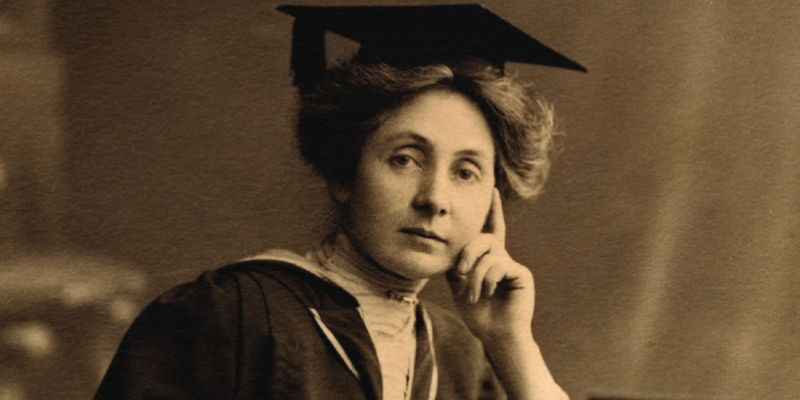Mary Ryan remembered on International Women's Day

In 1910 Mary Ryan became Professor of romance languages at University College Cork, becoming the first female Professor in Ireland. On International Women's Day, we remember a trailblazer in education.
University College Cork (UCC), celebrating its 175th year in 2020, is highlighting Mary Ryan on this International Women’s Day – a pioneer who paved the way for female academics in Ireland.
Mary Ryan became the first woman university professor in Ireland on 25 June 1910, when she was appointed to the Chair of Romance Languages at University College Cork. While records of her appointment barely mention her gender, it was, nonetheless, a major breakthrough for full female participation in university life. Moreover, it came during a period of rapid progress for women in higher education and Irish society.
The National University of Ireland Act (1908) had, for the first time, recognised the principle of gender equality, which was then enshrined in the new charter under which Queen’s College Cork (QCC) became UCC. Women were first admitted as students to QCC in 1886, but numbers remained small, in part owing to the opposition of Ireland’s Catholic bishops to the colleges, Ryan herself noting ‘there were difficulties about Catholic women students attending lectures at QCC’.
Mary took her BA degree in the Royal University of Ireland (RUI) in 1895 without setting foot in a University college, instead preparing for examinations through private study, supported by her secondary school, St Angela’s College.
In 1902, Mary joined the Cork branch of the newly-formed Irish Women Graduates’ Association, which campaigned for better opportunities and facilities for women in Irish universities. A leading figure in the Cork branch was Lucy Smith, one of QCC’s first women medicine graduates in 1898, who highlighted in particular the exclusion of women medical students from practical classes, with some professors still refusing to admit them.
This happened against the backdrop of the era of women’s suffrage agitation and reform, culminating in equal voting rights from 1922.
Change came gradually at first in UCC, then quickly. The first female staff appointments were those of Miss Martin as lecturer in Methods of Education in 1905, and of Miss Bowen-Colthurst as demonstrator in Mineralogy in 1907.
Ryan was appointed Lecturer in German in Autumn 1909, having delivered lectures in French and German earlier in the year, when she covered for William F Butler, Professor of Modern Languages. She was joined by two more women professors in July 1911, following a change to University statutes which saw lecturers in certain subjects promoted. These included Ryan’s old friend, Elizabeth M O’Sullivan (Methods of Education), who had attended St Angela’s with her, and her colleague Walberga (Wally) Swertz (German).
In 1909, Dr Lucy Smith became the first woman to be appointed to UCC’s new Governing Body.
After 1908, the new university structure, now supported by the Catholic bishops, saw a sharp increase in numbers of female students. For example, while there were only 17 in 1906, this had risen to 74 by 1910, and represented nearly 20% of the total student body.
Referring to herself and O’Sullivan, Ryan noted ‘on our appointment to UCC it was assumed by everyone, including ourselves, that we must take a special interest in the women students’. Throughout their careers, both acted as women’s dean of residence, president and treasurer of the Women’s Club, and as representatives on the Governing Body, and promoted the interests and wellbeing of female students. At the time of Ryan’s retirement (1939), female students made up almost 30% of the total.
By the 1980s, they would outnumber men, a century after their first admission.
Ryan’s promotion of French culture saw her become the first Irish woman to be awarded the Legion d’Honneur, France’s highest order of merit, in 1935. In 2015, one of her successors as professor of French at UCC, Grace Neville, became the third Irish woman to receive this award. As an under-graduate, Professor Neville had won the Edward and Matilda Ryan Scholarship, founded by Mary Ryan in honour of her parents. Mary Ryan Scholarships are now offered to language students in UCC.
Mary Ryan was, as a colleague noted at her death, ‘a pioneer of higher education for women’.
On International Women’s Day 2020, in the year in which UCC marks the 175th anniversary of its foundation, we celebrate her as an inspiring and ground-breaking figure in the journey towards gender equality in Ireland’s universities, and Irish society.
